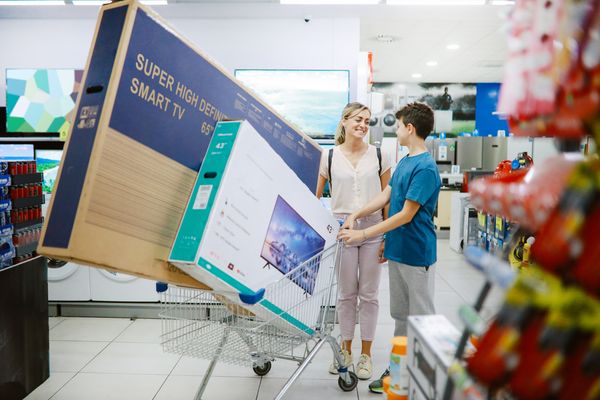If you put a positive spin on rent-to-own or lease-to-own programs, they allow customers to have access to items they may otherwise not be able to afford. That makes sense when a person truly needs an item -- say, a computer in order to do their job. In many cases, however, this type of program leads to people who can't qualify for credit paying more for items they can't really afford.
Rent-to-own has generally been the province of companies like Rent-a-Center that target lower-income consumers. Now Best Buy (BBY 0.56%) has begun testing a pilot program using another stalwart in the space, Progressive Leasing (a subsidiary of the Aaron's rent-to-own retail chain), according to a news story from Twice.
Check out the latest earnings call transcript for Best Buy.

Best Buy is adding lease-to-own programs to many of its stores. Image source: Best Buy.
What is Best Buy doing?
Best Buy has been testing its "progressive leasing" program in Texas and will roll the offer out to 35 states by the spring, according to the Twice report. Customers can apply at kiosks or with employees in stores, with approval being based on their employment and banking history.
If approved, the customer makes periodic payments automatically from a checking account. Leases, which are for 12 months, can be paid off early, with the terms of doing so varying by state, according to Best Buy's FAQ. A payment estimator offered on the application site showed that a $1,000 purchase made through the program at a Dallas-area Best Buy would cost the consumer $174.17 a month or $2,169 in total.
Best Buy's CFO, Corie Barry, defended the program during the company's fourth-quarter earnings call. She did not address the heavy premium customers would pay for access to the items they're renting to own.
"We were pleased with the results that we've been seeing and, therefore, are now going to expand the number of stores with our leasing solution," she said. "I think what we like about it is it actually opens up the opportunity for customers who might not otherwise be able to have credit or otherwise be able to have access to the kind of products that we sell. It opens up access to that product to a whole new customer base for us."
Barry noted that in the initial testing of the program, only about 1% of customers defaulted on their lease payments. She also explained that some of the customers using the program don't have bad credit, they "just have no credit, and this is the start for them to be able to build a credit portfolio and actually will lead to a much more robust credit portfolio over time."
Is this a smart move for Best Buy?
Clearly, leasing opens up a new customer base, and it comes with very high profit margins. The challenge is that while some customers will be happy to get extended a form of credit, the optics of charging $2,169 for a $1,000 item aren't great, and they don't seem to jibe with Best Buy's self-professed ethics.
The company was recently lauded as one of the 2019 World's Most Ethical Companies by Ethisphere Institute. That's a designation the company celebrated in a press release in which CEO Hubert Joly laid out what he sees as the company's philosophy.
"Best Buy is an organization with a heart and soul, built upon purposeful, values-driven leadership," he said. "We demonstrate this a number of ways, including by the way we ethically serve our customers or colleagues, engage with underserved communities through our Teen Tech Centers or do our part to save our planet through a 50 percent reduction in carbon emissions."
Offering rent-to-own may be a service for a small percentage of the people who use it, but in general, it's a dangerous practice for lower-income customers. Yes, it might offer a needed lifeline to a consumer in desperate need of a new stove or a new refrigerator, but in many cases, rent-to-own leads to the people who can least afford it paying more for things they don't truly need. That doesn't seem like something Best Buy should stake its hard-earned reputation on.





